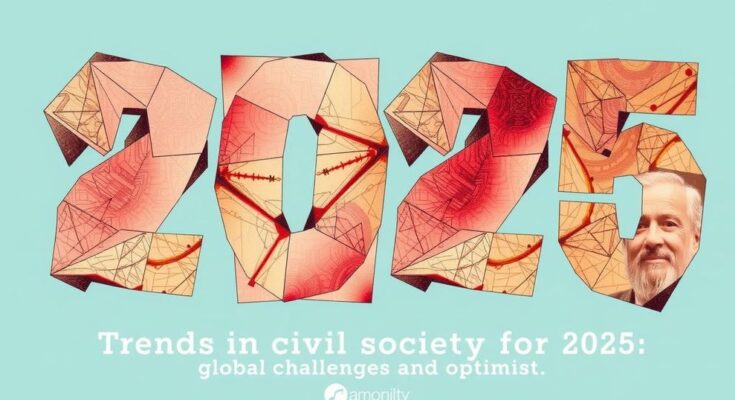Civil society faces heightened challenges as it strives for human rights and social justice amid global conflicts and climate change. Economic instability may provoke unrest, while political dynamics favoring authoritarianism threaten civil liberties. Nonetheless, activists continue to achieve significant victories in human rights and environmental legislation. As 2025 approaches, the resilience and dedication of civil society offer hope for a just future despite ongoing struggles.
The year 2024 has been extremely challenging for civil societies worldwide, particularly in their efforts to uphold human rights and social justice. As various global tensions increase and conflicts threaten to resurface, the demand for civil action continues to grow. The upcoming year, 2025, poses even more significant challenges, particularly concerning climate change and its impacts on global stability and security. As per the Paris Agreement, nations are expected to act decisively to mitigate greenhouse gas emissions by the COP30 summit in Brazil. If this does not occur, issues surrounding climate adaptation and resource allocation will come to the forefront.
Economic distress is likely to worsen, further widening the gap between the impoverished majority and the affluent minority. Such growing economic disparities will likely provoke social unrest, particularly among disenfranchised youth seeking political alternatives. These circumstances provide fertile ground for right-wing populism and nationalism, which often capitalizes on social discontent while pushing back against labor rights movements.
As elections continue globally, significant demographic shifts could see voters favor change, rejecting incumbents amidst economic challenges. However, the reaction from established right-wing factions may include authoritarianism and increased hostility towards marginalized communities, intensifying societal divisions.
Technological advancements, particularly in AI, may present new threats as state surveillance grows in sophistication and activism faces increased scrutiny. The fight against misinformation remains critical, with social media platforms increasingly being challenged by authoritarian agendas. Despite these adversities, the spirit of resistance among civil societies persists, demonstrated by notable victories regarding equality and human rights legislation across various countries.
The landscape of civil society activism is further complicated by increasing repression, particularly concerning women’s and LGBTQI+ rights, especially from conservative movements both in the global north and south. With ongoing disinformation campaigns impacting public perception, civil society’s capacity to advocate effectively remains at risk.
Despite persistent adversities, civil society organizations and activists demonstrate remarkable resilience, employing multifaceted approaches such as advocacy, strategic litigation, and international cooperation to effect change. Successful endeavors throughout 2024 have included landmark legal victories on climate action and human rights, underscoring the enduring importance of civil engagement. As 2025 approaches, civil society holds on to the hope for a just and sustainable world, emphasizing the necessity of solidarity in their struggles against oppression.
The article discusses the mounting challenges faced by civil societies around the globe as we approach 2025. It outlines pressing issues such as climate change, economic inequality, political instability, and social injustices that threaten to curtail civil liberties and human rights. The impending COP30 climate summit marks a critical juncture for global collaboration aimed at mitigating climate change. Simultaneously, electoral dynamics reveal a trend toward right-wing populism, which further complicates civil society’s mission to advocate for justice and equality.
In conclusion, 2025 poses numerous challenges for civil society as it grapples with worsening economic conditions, political repression, and ongoing threats to human rights. While the landscape may appear bleak, the persistent effort of activists and organizations offers a glimmer of hope. Achievements in legal reforms and collective resistance indicate that, despite formidable obstacles, civil society maintains a crucial role in advocating for change and standing against repression, aspiring towards a more equitable and sustainable future.
Original Source: www.ipsnews.net




